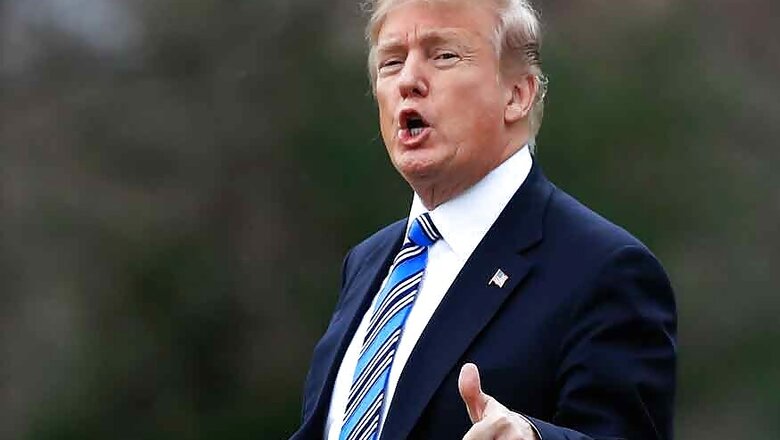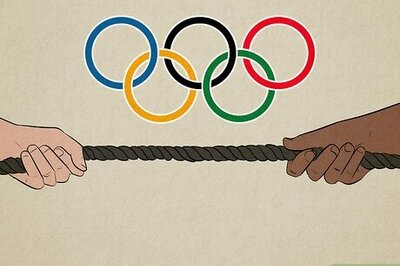
views
Washington/ Seoul: The United States said on Friday it was imposing its largest package of sanctions against North Korea on Friday, intensifying pressure on Pyongyang to give up its nuclear and missile programmes.
In addressing the Trump administration's biggest national security challenge, the U.S. Treasury sanctioned one person, 27 companies and 28 ships, according to a statement on the U.S. Treasury Department's website.
The actions block assets held by the firms in the United States and prohibit U.S. citizens from dealing with them.
North Korea's missile and nuclear programme is seeking to develop a nuclear-tipped missile capable of reaching the U.S. mainland. Trump and North Korean leader Kim Jong Un have taunted each other through the media and in August Trump threatened to go beyond sanctions by bringing "fire and fury like the world has never seen."
The Treasury's Office of Foreign Assets Control announced the measures, which are designed to disrupt North Korean shipping and trading companies and vessels and to further isolate Pyongyang.
Treasury Secretary Steve Mnuchin said in a statement the sanctions against the ships would help prevent Kim's government from conducting "evasive maritime activities that facilitate illicit coal and fuel transports and erode its abilities to ship goods through international waters.”
The ships are located, registered or flagged in North Korea, China, Singapore, Taiwan, Hong Kong, Marshall Islands, Tanzania, Panama and Comoros, Treasury said.
Those targeted included a Taiwanese passport holder and mainland China, Hong Kong, Taiwan and Singapore shipping and energy firms.
"We imposed today the heaviest sanctions ever imposed on a country before," Trump said in an address to a conservative activist group in Washington. "And ... hopefully something positive can happen, we will see."
The United States has led an international campaign to tighten sanctions on North Korea to force it to give up its development of weapons and missiles program.
"The president is clearly frustrated and rightly so over the efforts that have failed in the past and also over the uptick in testing and the advances we've seen in the North Korean program," a senior administration official said at a background briefing for reporters.
"VERY IMPACTFUL"
At another briefing in Washington, Treasury Secretary Steve Mnuchin stood next to enlarged photos he said showed December 2017 images that revealed ship-to-ship transfers of fuel and other products destined for North Korea in an attempt to evade sanctions.
"This is very impactful. We're going to do everything to stop these ship-to-ship transfers," Mnuchin said.
Washington "also issued an advisory alerting the public to the significant sanctions risks to those continuing to enable shipments of goods to and from North Korea."
Tougher sanctions may jeopardise the latest detente between the two Koreas, illustrated by the North's participation in the Winter Olympics in the South, amid preparations for talks about a possible summit between North Korean leader Kim Jong Un and South Korean President Moon Jae-in.
North Korea last year conducted dozens of missile launches and its sixth and largest nuclear test in defiance of U.N. Security Council resolutions. It defends the weapons programmes as essential to deter U.S. aggression.
It has been more than two months since North Korea's last missile test.
Kim said he wants to boost the "warm climate of reconciliation and dialogue" with South Korea, which hosts 28,500 U.S. troops, after a high-level delegation, including his sister, returned from the Olympics.
In an extension of that rapprochement, the North agreed on Friday to hold working-level talks on Tuesday for the Pyeongchang Winter Paralympics on the North's side of the border village of Panmunjom.
U.N. SANCTIONS
In December the United Nations approved U.S.-drafted limiting North Korea's access to refined petroleum products and crude oil, which the North Korean Foreign Ministry said amounted to an act of war. In January Washington announced a round of sanctions and urged China and Russia to expel North Koreans raising funds for the programmes.
The new U.S. sanctions were announced while Trump's daughter, Ivanka, is visiting South Korea. She had dinner with Moon after a closed-door meeting with the president.
At a dinner with Moon at Seoul’s presidential Blue House, she said the purpose was also to "reaffirm our commitment to our maximum pressure campaign to ensure that the Korean Peninsula is denuclearized."
Moon said North Korea's participation in the Olympics had “led to lowering of tensions on the peninsula and an improvement in inter-Korean relations" and were thanks to President Trump's “strong support for inter-Korean dialogue.”
Moon, cited by his spokesman, Yoon Young-chan, said at a news conference South Korea cannot acknowledge North Korea as a nuclear state and talks with the North on denuclearisation and improving inter-Korean relations must go hand in hand.
He said close cooperation between the United States and South Korea is important for the talks.
Moon made the comments to Ivanka Trump.
Her visit to South Korea coincides with that of a sanctioned North Korean official, Kim Yong Chol, blamed for the deadly 2010 sinking of a South Korean navy ship that killed 46 sailors. His delegation will attend the closing ceremony and also meet Moon.
The Blue House has said there are no official opportunities for U.S. and North Korean officials to meet.
Kim Yong Chol is the vice chairman of the North's ruling Workers' Party's Central Committee and was previously chief of the Reconnaissance General Bureau, a top North Korean military intelligence agency that South Korea blamed for the sinking of its navy corvette, the Cheonan. North Korea has denied any involvement.
Seoul said it approved the pending visit by Kim Yong Chol in the pursuit of peace and asked for public understanding in the face of opposition protests.
Kim Yong Chol currently heads the United Front Department, the North's office responsible for handling inter-Korean affairs.
South Korea's decision on Thursday to allow in Kim Yong Chol, currently sanctioned by the United States and South Korea, sparked protest from family members of the dead sailors and opposition parties.
Many have been angered at the North's participation at the Games, which they say has been a reward for bad behaviour with no quid pro quo from Pyongyang.


















Comments
0 comment